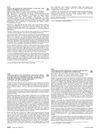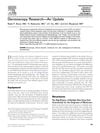
Women with polycystic ovary syndrome (PCOS) show higher levels of hope, judgement, perspective, and transcendence, and could benefit from positive psychology therapy.
64 citations,
April 2005 in “Journal of Investigative Dermatology” Topical oligonucleotide therapy targets hair follicles effectively.
 24 citations,
July 2019 in “Reproductive Medicine and Biology”
24 citations,
July 2019 in “Reproductive Medicine and Biology” The review suggests new ways to classify ejaculation problems and recommends different treatments based on the type of issue.
 5 citations,
September 2021 in “Dermatology Reports”
5 citations,
September 2021 in “Dermatology Reports” Skin problems like acne and excess hair in PCOS are common and linked to being overweight.
 1 citations,
January 2023 in “Aesthetic surgery journal”
1 citations,
January 2023 in “Aesthetic surgery journal” Facial plastic surgeries and aesthetic procedures are becoming more popular in India, with a preference for non-surgical options and effective treatments for facial enhancement and hair loss.
January 2024 in “Medicina” Statins may help treat PCOS by lowering androgen levels and improving cholesterol.
83 citations,
August 2020 in “Resources” Macroalgae compounds offer sustainable, effective benefits for cosmetics.
42 citations,
December 2011 in “The journal of immunology/The Journal of immunology” RANKL causes lymph nodes to grow by making certain cells multiply.
32 citations,
February 2019 in “eLife” BMP signaling is essential for the development of touch domes.
 29 citations,
October 2020 in “eLife”
29 citations,
October 2020 in “eLife” Higher testosterone levels can increase the risk of certain diseases like type 2 diabetes in women and prostate cancer in men, but can also protect against autoimmune diseases and hair loss. It also affects body fat and bone density.
 16 citations,
October 2023 in “Molecular cancer”
16 citations,
October 2023 in “Molecular cancer” New treatments like nanotechnology show promise in improving skin cancer therapy.
16 citations,
September 2019 in “Journal of biological chemistry/The Journal of biological chemistry” Mice without certain skin enzymes have faster hair growth and bigger eye glands.
16 citations,
February 2014 in “Iranian Red Crescent Medical Journal” Polycystic Ovary Syndrome (PCOS) affects Iranian women's feelings of femininity and self-image.
 5 citations,
February 2022 in “Acta Biomaterialia”
5 citations,
February 2022 in “Acta Biomaterialia” Nanomaterials can improve hair care products and treatments, including hair loss and alopecia, by enhancing stability and safety, and allowing controlled release of compounds, but their safety in cosmetics needs more understanding.
3 citations,
February 2024 in “International journal of molecular sciences” Hesperidin from orange peels is a promising natural ingredient for skincare due to its multiple beneficial properties.
3 citations,
November 2022 in “International journal of environmental research and public health/International journal of environmental research and public health” Ethnic Indian women with PCOS often have early symptoms, delayed diagnosis, and need better information and support for treatment and lifestyle management.
 1 citations,
September 2023 in “Stem cell research & therapy”
1 citations,
September 2023 in “Stem cell research & therapy” Mesenchymal stem cells could help treat aging-related diseases better than current methods.
 1 citations,
July 2017 in “Clinical research in dermatology”
1 citations,
July 2017 in “Clinical research in dermatology” Hair loss, known as Androgenetic Alopecia, is often caused by hormones and can be diagnosed using noninvasive techniques. Treatments include topical minoxidil and oral finasteride, with new treatments being explored. There may also be a link between this type of hair loss and heart disease risk.
 November 2024 in “Frontiers in Medicine”
November 2024 in “Frontiers in Medicine” Cirrhosis affects quality of life with various symptoms, requiring a holistic, multidisciplinary approach for management.
 September 2024 in “Current Oncology”
September 2024 in “Current Oncology” Docetaxel often causes hair loss, with limited effective treatments and no cure for permanent hair loss.
 September 2024 in “Archiv Euromedica”
September 2024 in “Archiv Euromedica” Trichoscopy is a quick, accurate, and non-invasive method to diagnose and treat non-scarring hair loss.
 August 2024 in “Cosmetics”
August 2024 in “Cosmetics” K18® and Olaplex® both effectively repair bleached hair, improving its strength, smoothness, and overall health.
 February 2024 in “ACS Omega”
February 2024 in “ACS Omega” The Shen Bai Hair Growing Decoction may help treat hair loss by promoting hair growth and reducing inflammation.
 October 2023 in “IntechOpen eBooks”
October 2023 in “IntechOpen eBooks” Genes and epigenetic changes are important in the development of Polycystic Ovary Syndrome.
 August 2023 in “International Journal of Molecular Sciences”
August 2023 in “International Journal of Molecular Sciences” Human skin xenografting could improve our understanding of skin development, renewal, and healing.
 May 2023 in “Journal of Clinical Medicine”
May 2023 in “Journal of Clinical Medicine” New understanding and treatments for hair loss are improving, but more research is needed.
 February 2023 in “Frontiers in Endocrinology”
February 2023 in “Frontiers in Endocrinology” Too much male hormone in mothers can negatively affect the sexual behavior of both male and female baby mice.
 August 2018 in “Journal of The American Academy of Dermatology”
August 2018 in “Journal of The American Academy of Dermatology” Aging significantly affects the hair and scalp of nonbalding Caucasian women, with changes that differ from male pattern baldness.
 39 citations,
December 2008 in “Clinics in Dermatology”
39 citations,
December 2008 in “Clinics in Dermatology” Dermoscopy has improved skin cancer diagnosis and has expanding applications in dermatology, but requires staying updated with new research and techniques.
 30 citations,
September 2009 in “Seminars in Cutaneous Medicine and Surgery”
30 citations,
September 2009 in “Seminars in Cutaneous Medicine and Surgery” Dermoscopy has greatly improved the diagnosis of skin lesions and our understanding of their morphology and biology.




















